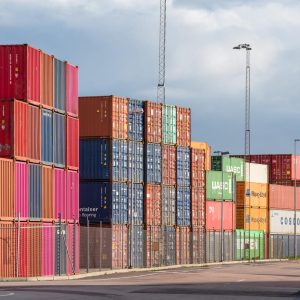More goods are being shipped than ever before. At the same time, it is increasing urgent that we accelerate the green transition. To become climate neutral within the foreseeable future requires smart solutions and a willingness from all logistics chain stakeholders to cooperate in completely new ways. That is the starting point for the Helsingborg Declaration, the logistics sector’s equivalent to the Paris Agreement with a view to achieving climate neutrality by 2030. The goal is for the Helsingborg region to become Europe’s most sustainable and fast-moving logistics hub, where politicians, businesses, academia, and civil society are all important pieces of the puzzle.
Climate change is one of the greatest challenges of our time. There are few issues as important for our future welfare, and green growth is high on the agenda for decision makers worldwide. In order to avoid the most catastrophic consequences of climate change, we must rapidly reduce our greenhouse gas emissions.
During H22 City Expo, the Helsingborg Declaration was launched, and leading representatives from 44 major stakeholders in the logistics chain signed the agreement. Companies such as Scania, Schenker, Nowaste Logistics, Skanska, PostNord TPL, Höganäs AB, the Port of Helsingborg, Catena Fastigheter declared common goals and a willingness to cooperate to meet climate challenges.
“The companies we are working with already have their own climate goals and work with their own metrics and reports. But what would they like to do in their climate work that they are unable to do on their own? That’s where the Helsingborg Declaration comes in. A neutral platform to bring together actors throughout the logistics chain and find new ways forward,” says Annette Melander Berg, Business Director at the City of Helsingborg.
The Helsingborg Declaration highlights five strategic areas with strong potential for green transition in different parts of the logistics chain:
- Fossil-free energy
- Smart, seamless, and efficient logistics
- Technology and infrastructure
- Packaging logistics
- Circularity, reuse, and recycling
These areas have been selected as they focus on climate change impacts that are close to the business operations and can therefore be influenced. Everyone who signs the declaration has the ambition to accelerate their transition to climate neutrality by 2030. The impact lies in taking action together – organisations both large and small at all levels and all stages of the supply chain.
“We try to engage actors at all levels. In some cases, these are companies that are direct competitors but which have a common goal in their sustainability work. The city’s role as a neutral actor is crucial in bringing these stakeholders together in a powerful network,” says Annette Melander Berg.
The exponential climate gains are not only beneficial for Helsingborg, the region, or the climate in general, but can also provide competitive advantages, both in securing talent but also customers who, across the board, have increasing demands for sustainable practices.
At the end of September, representatives from the companies that are part of the Helsingborg Declaration gathered to start discussions about how they can together accelerate the green transition. This transition is seen as a business opportunity and a competitive advantage, with the overall goal of climate neutrality by 2030.
The next step is for the companies to create working groups that share challenges and which have identified possible areas of cooperation with great potential. These areas include increased production of fossil-free energy, conversion to fossil-free transport and charging infrastructure, logistics synergies/smart loading logistics, collaboration for increased investment gains, optimised packaging and material handling in the construction industry, increased recycling and circularity for packaging within construction, industry, and retail, and increased reuse of building materials.


